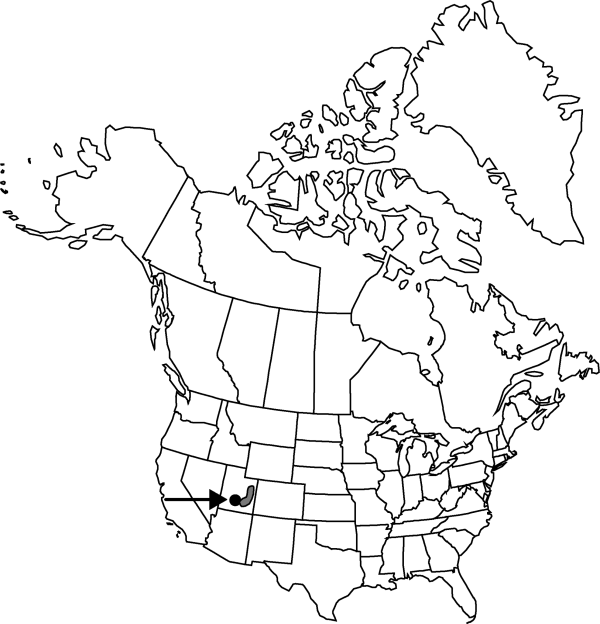Difference between revisions of "Atriplex powellii var. minuticarpa"
Rhodora 102: 421. 2001.
FNA>Volume Importer |
imported>Volume Importer |
||
| (3 intermediate revisions by 2 users not shown) | |||
| Line 8: | Line 8: | ||
}} | }} | ||
|common_names=Smallbract orach | |common_names=Smallbract orach | ||
| + | |special_status={{Treatment/ID/Special_status | ||
| + | |code=E | ||
| + | |label=Endemic | ||
| + | }} | ||
|basionyms={{Treatment/ID/Basionym | |basionyms={{Treatment/ID/Basionym | ||
|name=Atriplex minuticarpa | |name=Atriplex minuticarpa | ||
|authority=Stutz & G. L. Chu | |authority=Stutz & G. L. Chu | ||
| + | |rank=species | ||
|publication_title=Madroño | |publication_title=Madroño | ||
|publication_place=40: 161, fig. 1. 1993 | |publication_place=40: 161, fig. 1. 1993 | ||
| Line 29: | Line 34: | ||
|elevation=1200-1400 m | |elevation=1200-1400 m | ||
|distribution=Utah. | |distribution=Utah. | ||
| − | |discussion=<p>This entity is completely within the distribution of < | + | |discussion=<p>This entity is completely within the distribution of <i></i>var.<i> powellii</i> in southeast Utah, where it occurs on the fine-textured saline and seleniferous silts and clays of exposed Jurassic and Cretaceous strata. The habits of growth of the two taxa are essentially identical, and the shape of both the foliage and bracteate leaves is essentially the same. The fruiting bracteoles of <i></i>var.<i> minuticarpa</i>, though small, occasionally bear finger-like surficial appendages and share the rounded lateral lobes marginal to the terminal cusp and violin shape with <i></i>var.<i> powellii</i>. This small-bracteolate plant evidently occupies a much more limited set of ecological circumstances than its near ally.</p> |
|tables= | |tables= | ||
|references= | |references= | ||
| Line 38: | Line 43: | ||
-->{{#Taxon: | -->{{#Taxon: | ||
name=Atriplex powellii var. minuticarpa | name=Atriplex powellii var. minuticarpa | ||
| − | |||
|authority=(Stutz & G. L. Chu) S. L. Welsh | |authority=(Stutz & G. L. Chu) S. L. Welsh | ||
|rank=variety | |rank=variety | ||
| Line 52: | Line 56: | ||
|publication title=Rhodora | |publication title=Rhodora | ||
|publication year=2001 | |publication year=2001 | ||
| − | |special status= | + | |special status=Endemic |
| − | |source xml=https:// | + | |source xml=https://bitbucket.org/aafc-mbb/fna-data-curation/src/2e0870ddd59836b60bcf96646a41e87ea5a5943a/coarse_grained_fna_xml/V4/V4_679.xml |
|genus=Atriplex | |genus=Atriplex | ||
|subgenus=Atriplex subg. Obione | |subgenus=Atriplex subg. Obione | ||
Latest revision as of 22:00, 5 November 2020
Herbs, monoecious, (0.5–)1–4.5 dm. Leaves on petioles 0.3–1.5(–2) cm proximally, becoming sessile distally, blade inconspicuously 3-veined, deltoid-ovate to orbicular-ovate or cordate-ovate, 5–20(–30) mm and as wide, base broadly cuneate to subcordate, apex acute to shortly acuminate, scurfy. Flowers of both sexes intermixed in axillary glomerules. Staminate flowers 5-merous. Fruiting bracteoles ovate-oblong or oval to obovate, 1.5–2.5 × 1–2.5 mm, subentire to tridentate apically, median tooth largest, lateral lobes often rounded and sometimes constricted basally, giving an overall violin shape, sometimes slenderly appendaged marginally and bicristate on at least 1 face, but typically unappendaged on faces. Seeds yellow-brown, 0.9–1.2 mm.
Phenology: Flowering spring–fall.
Habitat: Tununk and Blue Gate members Mancos Shale Formation and on Morrison Formation, and likely on other fine-textured saline substrates, with mat-atriplex, greasewood, rabbitbrush, and shadscale communities
Elevation: 1200-1400 m
Discussion
This entity is completely within the distribution of var. powellii in southeast Utah, where it occurs on the fine-textured saline and seleniferous silts and clays of exposed Jurassic and Cretaceous strata. The habits of growth of the two taxa are essentially identical, and the shape of both the foliage and bracteate leaves is essentially the same. The fruiting bracteoles of var. minuticarpa, though small, occasionally bear finger-like surficial appendages and share the rounded lateral lobes marginal to the terminal cusp and violin shape with var. powellii. This small-bracteolate plant evidently occupies a much more limited set of ecological circumstances than its near ally.
Selected References
None.
